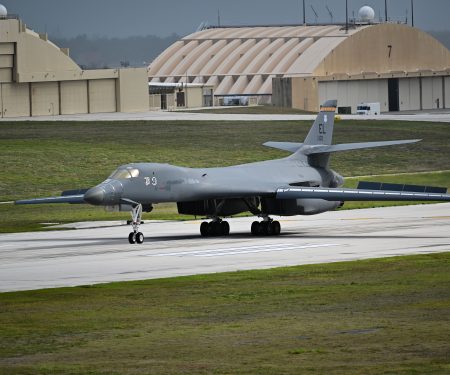Radar Sweep
US Lawmakers Pledge Support for Taiwan and its New President After China’s Military Drills
A U.S. congressional delegation met Taiwan’s new leader on May 27 in a show of support days after China held drills around the self-governing island in response to his inauguration. Rep. Andy Barr, the co-chair of the Taiwan caucus in the U.S. Congress, said the United States is fully committed to supporting Taiwan militarily, diplomatically, and economically.
Russian Jamming Leaves Some High-Tech US Weapons Ineffective in Ukraine
Many U.S.-made satellite-guided munitions in Ukraine have failed to withstand Russian jamming technology, prompting Kyiv to stop using certain types of Western-provided armaments after effectiveness rates plummeted, according to senior Ukrainian military officials and confidential internal Ukrainian assessments obtained by The Washington Post.
Israeli Attack on Rafah Tent Camp Kills 45, Prompts International Outcry
An Israeli airstrike triggered a fire that killed 45 people in a tent camp in the Gazan city of Rafah, officials said on Monday, prompting an outcry from global leaders who urged the implementation of a World Court order to halt Israel's assault.
PODCAST: Tomorrow’s F-35: Cooling is Key
In episode 185 of the Aerospace Advantage, Heather “Lucky” Penney and Doug Birkey chat with Matt Pess, Chief Engineer on the Enhanced Power and Cooling System (EPACS) program at Collins Aerospace, about a key technology to sustain the F-35’s future capability growth. The fighter’s powerful sensor suite, computing power, and avionics set it apart as a hugely capable 21st century combat aircraft. Operating these technologies demands robust cooling via a key aircraft subsystem known as power thermal management system (PTMS), especially as new systems are fielded on subsequent versions of the aircraft.
China’s Secretive Spaceplane Releases Object into Orbit
China’s experimental reusable spacecraft has released an unknown object into orbit while conducting its third mission. U.S. Space Force space domain awareness teams cataloged the object as 59884 (International designator 2023-195G). The suspected spaceplane launched Dec. 14, 2023 and has been in orbit 164 days. The object appears to have been released May 24.
North Korea Says Attempt to Put Another Spy Satellite into Orbit Fails, Ends in Midair Explosion
A North Korean rocket carrying its second spy satellite exploded midair on May 27, state media reported, after its neighbors strongly rebuked its planned launch. The North’s official Korean Central News Agency said it launched a spy satellite aboard a new rocket at its main northwestern space center. But KCNA said the rocket blew up during a first-stage flight soon after liftoff due to a suspected engine problem.
Austin Resumes Pentagon Duties After Minimally Invasive Procedure
Defense Secretary Lloyd Austin resumed his powers after temporarily transferring them to his deputy as he underwent a medical procedure the evening of May 24. The Pentagon announced May 24 that Austin would be undergoing a “scheduled, elective, and minimally invasive” nonsurgical procedure on his bladder at the Walter Reed National Military Medical Center. His powers were temporarily transferred to Deputy Defense Secretary Kathleen Hicks.
America Is Getting Ready for Space Warfare
In space warfare, the U.S. military is seeking the ultimate high ground. The satellites central to national defense and global communications have long faced threats from the ground, such as signal jamming and missile attacks. Orbital menaces are the next frontier. Intelligence disclosures about Russia’s interest in antisatellite weapons and satellite launches from China have energized U.S. efforts to defend its interests hundreds and even thousands of miles above the Earth’s surface.
SDA to Develop Separate Ground System for FOO Fighter ‘Fire Control’ Sats
The Space Development Agency (SDA) is planning to develop a separate ground system infrastructure for its experimental “FOO Fighter” fire control satellites—with the first of two planned requests for proposals set for June 18, Director Derek Tournear said.
Space Force Inches Closer to Classified Remote Work
Some Guardians could soon do their classified work from home thanks to a new prototype. GDIT calls it the Enigma Project: a digital environment that allows users from government, academia, industry, and others to access classified and unclassified information from a single device.
Gen. Mattis on Foreign Influence Operations: The US Has Never Been ‘More Vulnerable’
A former defense secretary gave a stark warning Wednesday about how vulnerable he believes the nation is to foreign influence amid the upcoming 2024 election cycle. Retired Gen. Jim Mattis said during a special appearance at DefenseTalks, presented by DefenseScoop, that while election systems and voting infrastructure are perhaps the most secure they’ve ever been against cyberattacks, “the bigger problem and the one that I think that we are very vulnerable to right now is the influence operations.”
X-Bow Steps Up Hypersonic, Tactical, Launcher Rocket Developments
Startup solid rocket and small launch vehicle developer X-Bow Systems is accelerating production plans to support surging demand for hypersonic, surface-to-air, and tactical missile applications.
DIU Sees New Portfolio Deepening Ties Between Labs, Commercial Firms
The Defense Innovation Unit’s newest portfolio will forge deeper connections between the Pentagon’s science and technology community and the private sector firms developing cutting-edge capabilities in areas like quantum sensing, nanotechnology and microelectronics, officials told C4ISRNET.
US Military Funeral Traditions Honor the Fallen on Land, Air, and Sea
Growing numbers of Vietnam veterans are being laid to rest in recent years, and in many cases their families are attending military funerals. Every eligible veteran can receive military funeral honors. Among military burial traditions, the 21-gun salute is the oldest. In the 14th century, warships and shore forces fired off their guns to show that their weapons were empty and they were friendly.



